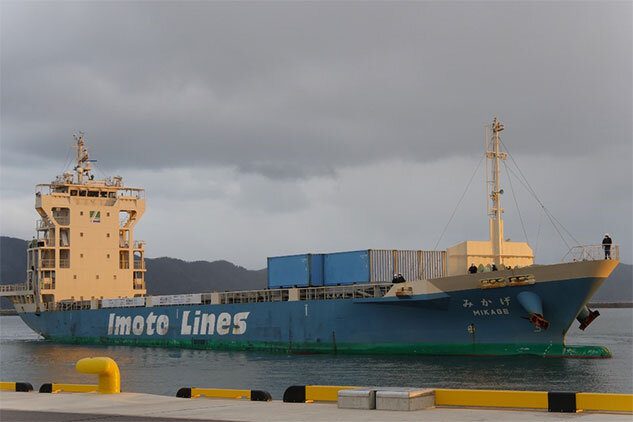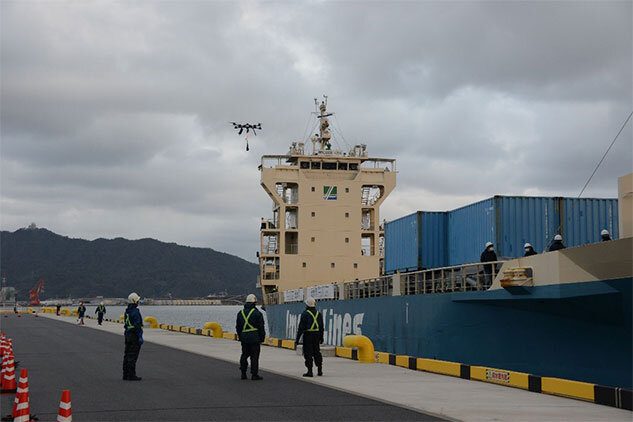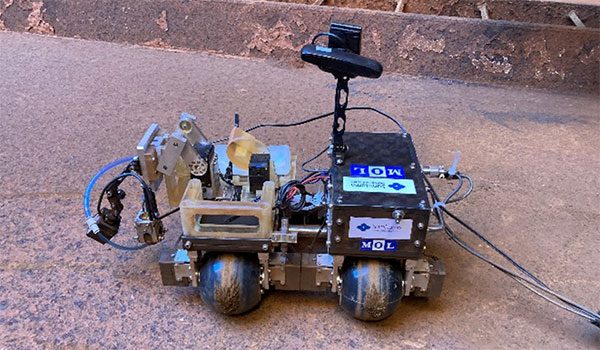28 November 2024
World’s First Sea Trial of an Autonomous Containership

TOKYO-Mitsui O.S.K. Lines, Ltd. (MOL; President & CEO Takeshi Hashimoto) today announced that together with its two group companies and the following consortium partners have successfully concluded the world’s first sea trial of an autonomous containership from port to port. Particularly, departure port: Tsuruga Port in Fukui Prefecture, arrival port: Sakai Port in Tottori Prefecture on 24th and 25th January.
Concept
In short, the following two points are major features of the consortium’s role in the MEGURI2040 autonomous containership operation projects:
- Firstly, Sea trial with two different types of ships: a coastal containership and a coastal car ferry, aimed at using the results to develop versatile technologies by identifying similarities and differences between the two ship types.
- Secondly, Mooring tests using a drone in a move toward automated mooring operation.
Since MEGURI2040’s inception in 2020, the consortium has conducted various elemental experiments. Hence, realizing autonomous ship operation. In October 2021, MOL Marine & Engineering Co., Ltd. conducted a safety verification test using its owned 3D simulator before this sea trial.
Consortium members and its main roles
| Company name | Main roles |
|---|---|
| MOL | Overall coordination, risk evaluation |
| Mitsui E&S Shipbuilding Co., Ltd. (MES-S; President: Isamu Funazu, Headquarters: Chuo-ku, Tokyo) | Development of “Judgement” and “Ship Operation” functions (Automated collision avoidance routing, automated ship operation in port, automated berthing/unberthing operation) |
| Furuno Electric Co., Ltd. (President: Yukio Furuno; Headquarters: Nishinomiya-shi, Hyogo Prefecture) | Development of “Cognitive” function (Integration of information from sensors during navigation and at berthing) |
| Imoto Lines, Ltd. (President: Takayuki Imoto; Headquarters: Kobe-shi, Hyogo Prefecture) | Provide test ship and seafarers, develop ship operation plan. |
| A.L.I. Technologies, Inc. (A.L.I.; President: Daisuke Katano; Headquarters: Minato-ku, Tokyo) | Development of mooring support technology (Throwing a heaving line from the ship to the pier using a unmanned drone) |
| MOL Ferry Co., Ltd. (President: Naotoshi Omoto; Headquarters: Chiyoda-ku, Tokyo) | Provide test ship and seafarers, develop ship operation plan. |
| MOL Marine & Engineering Co., Ltd. (President: Takashi Nakajima; Headquarters: Minato-ku, Tokyo) | Create simulation program of collision avoidance navigation/ berthing/unberthing for testing automated function of those scene. |
Development
For autonomous navigation, the ships followed a previously formulated route using the MES-S-developed autonomous ship operation control system, in consideration of the following elements.
- Accurately grasp ship location information
- Various external elements such as wind and tides/currents
- Ship handling performance specific to each ship (maneuverability, conditions of acceleration and deceleration)/configuration of ship handing equipment
- Navigation rules applied to ships
Additionally, information on other ships and obstacles/debris on the set route was gathered by the Furuno Electric-developed autonomous surrounding information integration system. Specifically, it measures and displays positions, speed, types of nearby ships, and position of obstacles/debris by integrating information gained by cognition through radar, AIS, and camera images. Following the integrated information, the ship navigated the safe route formulated by the autonomous collision avoidance routing system.

Furthermore, autonomous berthing and unberthing require especially delicate handling. Thus, the ship berths and unberths by using information from the Furuno Electric-developed berthing/unberthing support sensor. Note that, it is the equipment that calculates and visually displays accurate relative distances and relative angles between the pier and hull from information gathered by LiDAR/camera/satellite compass.
Moreover, “Automated mooring” is an element of the consortium’s project. Particularly, a crewmember on the ship passes the heaving line (to moor the ship in port) by throwing it to a worker on the pier. Hence, in this sea trial, the A.L.I.-developed automatic flight drone carried the line to the pier. Therefore, as technology advances in the future, this is expected to become an alternative approach to mooring operations, which is a heavy burden on seafarers.

Plan for future sea trial
In order to develop highly versatile technologies, the consortium plans a sea trial of autonomous navigation using the coastal car ferry “Sunflower Shiretoko,” which has different characteristics from the coastal containership.
| Ship | Ship type | Sea trial route | Schedule |
|---|---|---|---|
| Sunflower Shiretoko (owned by MOL Ferry) | Coastal car ferry | From Tomakomai To Oarai | February 2022 |
Nonetheless, the consortium continually aims to reduce the workload on seafarers and ensure safe, secure marine traffic, through MEGURI2040 initiatives to realize autonomous sailing.
Source: MOL Group
See Also: World’s First Green Autonomous Vessel


